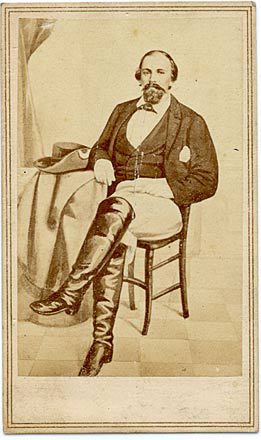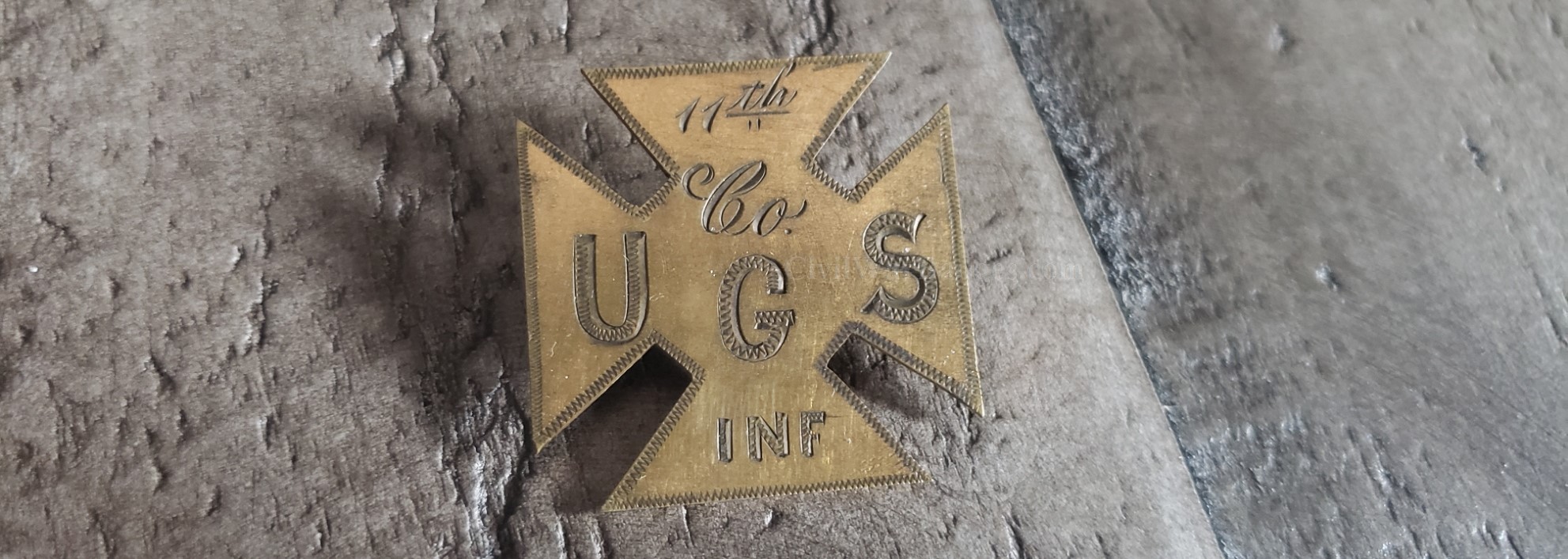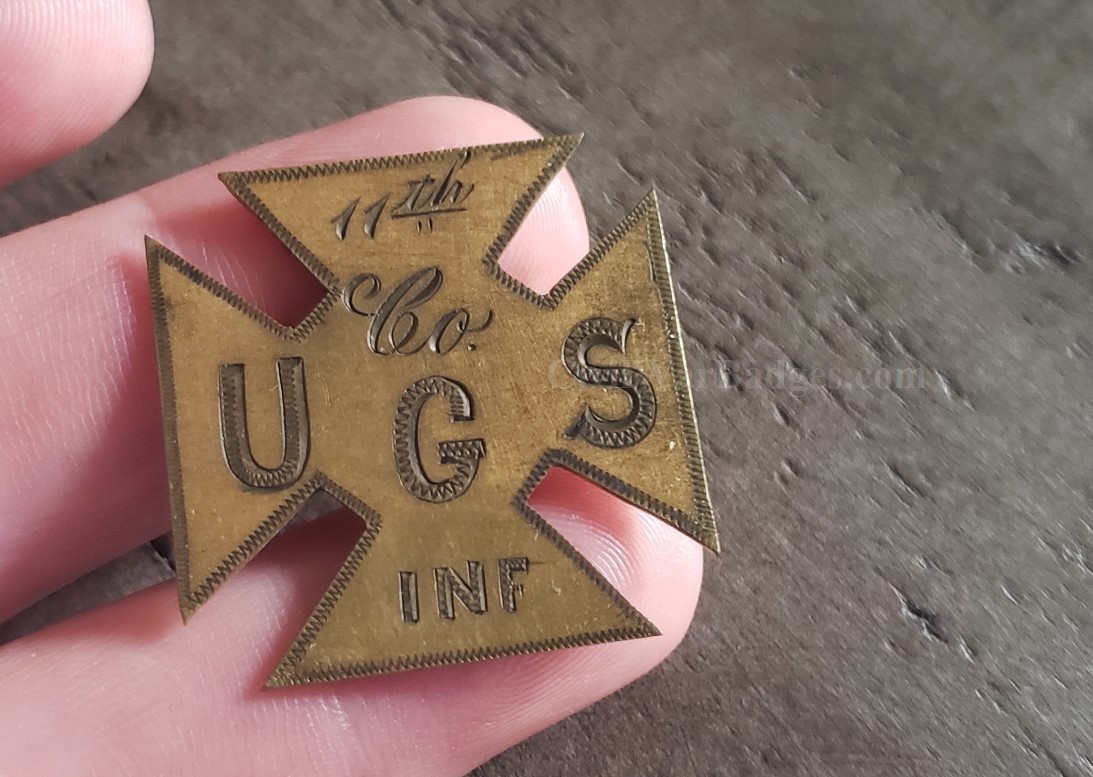11TH U.S. INFANTRY CO. G ~ 5TH ARMY CORPS BADGE ~ GETTYSBURG
Item #: CWB13250
Click on an image to enlarge
1 1/8" X 1 1/8" ~ 5TH CORPS DESIGN ~ IN VERY NICE CONDITION
Gettysburg after battle report: Report of Maj. De Lancey Floyd-Jones, Eleventh U. S. Infantry. Camp near Berlin, Md., July 16, 1863.
Capt.: In obedience to the circular from brigade headquarters, I have the honor to furnish in brief a report of the operations of the Eleventh U. S. Infantry at the battle of Gettysburg, on the 2d instant. In company with the other battalions of the brigade, we moved about 5 p. m. from our resting place, nearly opposite the center of the army, to near the Sugar Loaf or Round Top Mountain, a point near the left of the line. Immediately upon reaching this, we were ordered to advance in line of battle, passing from the shelter of a wood across an open field, through which ran a heavy morass. We advanced in good order, although exposed to a flank fire from the enemy, and halted immediately in front of a piece of woods, where we lay some half hour or more. Our brigade then relieved some troops of the Second Corps, for which purpose we advanced into the woods, at the same time changing our direction by a wheel to the left. After firing a few rounds in the woods, it was discovered that the enemy was turning our right flank, and we were ordered to fall back, which was done in good order until we reached half way across the open field, when we became exposed to a cross-fire of the enemy, the effect of which was most deadly upon officers and men. Our loss up to this time had been comparatively slight, but in a few minutes we lost nearly half of the regiment, and that, too, without inflicting the slightest damage upon the enemy. We finally reached the wood, when we were enabled to reform and face the enemy. Our loss in this engagement was fearful. Out of 261 enlisted men and 25 officers, the regiment lost 106 enlisted men and 10 commissioned officers, among the latter some of our best officers. Capt. Thomas O. Barri was wounded early in the retreat, and while being kindly assisted to the rear by Lieut. Herbert Kenaston, Eleventh U. S. Infantry, both were struck down. The former lived long enough to die in the arms of his companions. In their loss the regiment mourns two gallant officers. The former had particularly endeared himself by his social and amiable qualities. Second Lieut. Henry Rochford, a promising young officer, fell about the same time, mortally wounded.
The following is a list of the officers who still survive their wounds: First Lieut. Matthew Elder and Second Lieut. A. J. Barber, legs amputated above the knee; Second Lieut. Lemuel Pettee, leg shattered above the ankle; Second Lieut. O. H. Nealy, wounded in neck; Capt. J. M. Goodhue, finger amputated; Capt. W. G. Edgerton, wounded by spent ball (for duty), and Second Lieut. A. A. Harbach, struck in thigh, not seriously. Where all did so well it is difficult to particularize. I therefore give the names of those officers who participated, in addition to those already enumerated: Capts. George Gibson, C. S. Russell, and Caleb R. Layton; First Lieuts. E. A. Ellsworth, G. E. Head, I. B. Wright, James P. Pratt, Joseph M. Ritner, and F. A. Field, battalion adjutant, and Second Lieuts. E. S. Huntington, R. Robins, J. McIntosh, Wright Staples, and David Hazzard. Capt. Gibson joined us from detached service in time to take part. Respectfully, De L. FLOYD-JONES, Maj. Eleventh U. S. Infantry, Comdg. Regt. Acting Assistant Adjutant-Gen., Second Brigade, Second Division, Fifth Corps.
The 11th Infantry was organized on 4 May 1861 by direction of the President.[9] On 14 May 1861, President Abraham Lincoln issued an executive order, directing an increase of the regimental organizations of the Regular Army. The 11th Infantry was the first, numerically, of the nine infantry regiments, of three battalions of eight companies each, were of the increase authorized. In G. O. No. 33, A. G. O., series of 1861, in contrast to the original ten regular regiments of infantry, which were organized on the traditional ten-company line. The 11th Infantry was organized at Fort Independence, Boston Harbor, Massachusetts, as regimental headquarters, and which remained the 11th's headquarters during the War.
Erasmus D. Keyes was served as colonel of the 11th U.S. Infantry from 14 May 1861 to 6 May 1864.[2] William S. Ketchum served as colonel of the 11th U.S. Infantry 6 May 1864 to 15 March 1869.[2] After six companies had been organized and assigned to the 1st Battalion, 11th Infantry Regiment, it was ordered to Perryville, Maryland, 10 October 1861, and duty there until March 1862. Ordered to Washington, D.C. Attached to Sykes' Regular Infantry, Reserve Brigade, Army Potomac, to May 1862. The 11th then campaigned September 1863 to November 1864 as part of the 5th Army Corps, Army of the Potomac and 8th Army Corps, Middle Department, to January 1865.[9] The 11th took part in the following: Peninsula Campaign, Siege of Yorktown, Battle of Mechanicsville, Gaines' Mill, Turkey Bridge 30 June, Battle of Malvern Hill Malvern Hill, At Harrison's Landing until 16 August. Movement to Fortress Monroe, thence to Centerville 16–28 August. Pope's Northern Virginia Campaign, Battle of Groveton 29 August, Second Battle of Bull Run, Maryland Campaign, Battle of Antietam, Shepherdstown Ford 19–20 September, Battle of Fredericksburg, "Mud March", Chancellorsville Campaign 27 April – 6 May, Battle of Chancellorsville, Gettysburg Campaign, Battle of Gettysburg, Pursuit of Lee 5–24 July. On special duty at New York 21 August – 14 September. Rejoined army, Bristoe Campaign, Second Battle of Rappahannock Station, Mine Run Campaign, Rapidan Campaign, Battle of the Wilderness, Battle of Spotsylvania Court House, North Anna River, Pamunkey 26–28 May, Battle of Totopotomoy Creek, Battle of Cold Harbor, Bethesda Church 1–3 June, Second Battle of Petersburg, Siege of Petersburg, Mine Explosion, Petersburg, Weldon Railroad, Poplar Springs Church, Peeble's Farm, Boydton Plank Road, Hatcher's Run.[9] Moved to Fort Hamilton, New York Harbor, 2 November, thence to Baltimore, Maryland., 18 November, and to Annapolis, Maryland., 5 December. Duty at Camp Parole, Annapolis, Md., until 26 January 1865. Ordered to City Point, Virginia., 26 January, and camp near Gen. Grant's Headquarters until 8 March. Provost duty at Headquarters, Army Potomac, until May, and at Richmond. Va., until October 1865.[9] The regiment lost during the Civil War 8 officers and 117 enlisted men killed and mortally wounded and 2 officers and 86 enlisted men by disease. Total, 213.[9] After the surrender, the 11th Infantry with other Regular troops, was sent to Richmond, Va., where it arrived May 3d. It did provost duty in Richmond until the civil government of the city was organized, and at Libby Prison until its use was discontinued. During the summer and fall of 1865 the twenty-four companies of the regiment were organized. In the summer of 1866, the regiment suffered a great mortality from cholera.
Gettysburg after battle report: Report of Maj. De Lancey Floyd-Jones, Eleventh U. S. Infantry. Camp near Berlin, Md., July 16, 1863.
Capt.: In obedience to the circular from brigade headquarters, I have the honor to furnish in brief a report of the operations of the Eleventh U. S. Infantry at the battle of Gettysburg, on the 2d instant. In company with the other battalions of the brigade, we moved about 5 p. m. from our resting place, nearly opposite the center of the army, to near the Sugar Loaf or Round Top Mountain, a point near the left of the line. Immediately upon reaching this, we were ordered to advance in line of battle, passing from the shelter of a wood across an open field, through which ran a heavy morass. We advanced in good order, although exposed to a flank fire from the enemy, and halted immediately in front of a piece of woods, where we lay some half hour or more. Our brigade then relieved some troops of the Second Corps, for which purpose we advanced into the woods, at the same time changing our direction by a wheel to the left. After firing a few rounds in the woods, it was discovered that the enemy was turning our right flank, and we were ordered to fall back, which was done in good order until we reached half way across the open field, when we became exposed to a cross-fire of the enemy, the effect of which was most deadly upon officers and men. Our loss up to this time had been comparatively slight, but in a few minutes we lost nearly half of the regiment, and that, too, without inflicting the slightest damage upon the enemy. We finally reached the wood, when we were enabled to reform and face the enemy. Our loss in this engagement was fearful. Out of 261 enlisted men and 25 officers, the regiment lost 106 enlisted men and 10 commissioned officers, among the latter some of our best officers. Capt. Thomas O. Barri was wounded early in the retreat, and while being kindly assisted to the rear by Lieut. Herbert Kenaston, Eleventh U. S. Infantry, both were struck down. The former lived long enough to die in the arms of his companions. In their loss the regiment mourns two gallant officers. The former had particularly endeared himself by his social and amiable qualities. Second Lieut. Henry Rochford, a promising young officer, fell about the same time, mortally wounded.
The following is a list of the officers who still survive their wounds: First Lieut. Matthew Elder and Second Lieut. A. J. Barber, legs amputated above the knee; Second Lieut. Lemuel Pettee, leg shattered above the ankle; Second Lieut. O. H. Nealy, wounded in neck; Capt. J. M. Goodhue, finger amputated; Capt. W. G. Edgerton, wounded by spent ball (for duty), and Second Lieut. A. A. Harbach, struck in thigh, not seriously. Where all did so well it is difficult to particularize. I therefore give the names of those officers who participated, in addition to those already enumerated: Capts. George Gibson, C. S. Russell, and Caleb R. Layton; First Lieuts. E. A. Ellsworth, G. E. Head, I. B. Wright, James P. Pratt, Joseph M. Ritner, and F. A. Field, battalion adjutant, and Second Lieuts. E. S. Huntington, R. Robins, J. McIntosh, Wright Staples, and David Hazzard. Capt. Gibson joined us from detached service in time to take part. Respectfully, De L. FLOYD-JONES, Maj. Eleventh U. S. Infantry, Comdg. Regt. Acting Assistant Adjutant-Gen., Second Brigade, Second Division, Fifth Corps.
The 11th Infantry was organized on 4 May 1861 by direction of the President.[9] On 14 May 1861, President Abraham Lincoln issued an executive order, directing an increase of the regimental organizations of the Regular Army. The 11th Infantry was the first, numerically, of the nine infantry regiments, of three battalions of eight companies each, were of the increase authorized. In G. O. No. 33, A. G. O., series of 1861, in contrast to the original ten regular regiments of infantry, which were organized on the traditional ten-company line. The 11th Infantry was organized at Fort Independence, Boston Harbor, Massachusetts, as regimental headquarters, and which remained the 11th's headquarters during the War.
Erasmus D. Keyes was served as colonel of the 11th U.S. Infantry from 14 May 1861 to 6 May 1864.[2] William S. Ketchum served as colonel of the 11th U.S. Infantry 6 May 1864 to 15 March 1869.[2] After six companies had been organized and assigned to the 1st Battalion, 11th Infantry Regiment, it was ordered to Perryville, Maryland, 10 October 1861, and duty there until March 1862. Ordered to Washington, D.C. Attached to Sykes' Regular Infantry, Reserve Brigade, Army Potomac, to May 1862. The 11th then campaigned September 1863 to November 1864 as part of the 5th Army Corps, Army of the Potomac and 8th Army Corps, Middle Department, to January 1865.[9] The 11th took part in the following: Peninsula Campaign, Siege of Yorktown, Battle of Mechanicsville, Gaines' Mill, Turkey Bridge 30 June, Battle of Malvern Hill Malvern Hill, At Harrison's Landing until 16 August. Movement to Fortress Monroe, thence to Centerville 16–28 August. Pope's Northern Virginia Campaign, Battle of Groveton 29 August, Second Battle of Bull Run, Maryland Campaign, Battle of Antietam, Shepherdstown Ford 19–20 September, Battle of Fredericksburg, "Mud March", Chancellorsville Campaign 27 April – 6 May, Battle of Chancellorsville, Gettysburg Campaign, Battle of Gettysburg, Pursuit of Lee 5–24 July. On special duty at New York 21 August – 14 September. Rejoined army, Bristoe Campaign, Second Battle of Rappahannock Station, Mine Run Campaign, Rapidan Campaign, Battle of the Wilderness, Battle of Spotsylvania Court House, North Anna River, Pamunkey 26–28 May, Battle of Totopotomoy Creek, Battle of Cold Harbor, Bethesda Church 1–3 June, Second Battle of Petersburg, Siege of Petersburg, Mine Explosion, Petersburg, Weldon Railroad, Poplar Springs Church, Peeble's Farm, Boydton Plank Road, Hatcher's Run.[9] Moved to Fort Hamilton, New York Harbor, 2 November, thence to Baltimore, Maryland., 18 November, and to Annapolis, Maryland., 5 December. Duty at Camp Parole, Annapolis, Md., until 26 January 1865. Ordered to City Point, Virginia., 26 January, and camp near Gen. Grant's Headquarters until 8 March. Provost duty at Headquarters, Army Potomac, until May, and at Richmond. Va., until October 1865.[9] The regiment lost during the Civil War 8 officers and 117 enlisted men killed and mortally wounded and 2 officers and 86 enlisted men by disease. Total, 213.[9] After the surrender, the 11th Infantry with other Regular troops, was sent to Richmond, Va., where it arrived May 3d. It did provost duty in Richmond until the civil government of the city was organized, and at Libby Prison until its use was discontinued. During the summer and fall of 1865 the twenty-four companies of the regiment were organized. In the summer of 1866, the regiment suffered a great mortality from cholera.
Shipping Weight:
2 lbs
Item # CWB13250
$875.00 USD




